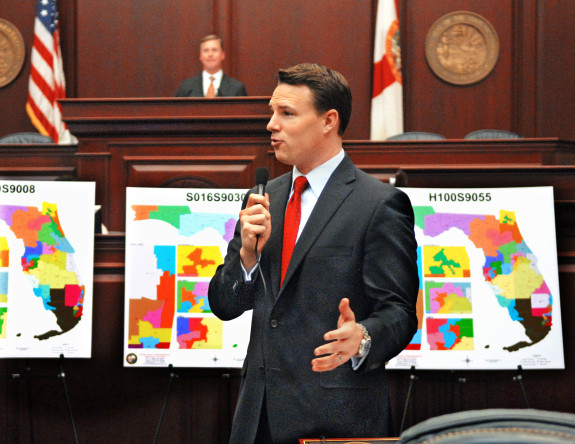
A circuit court judge invalidated the Florida Legislature’s congressional maps. (Photo via Myfloridahouse.gov)
By Ashley Lopez
Florida Center for Investigative Reporting
Last week, a circuit court judge ruled that the Florida Legislature broke state laws when drawing up congressional districts in 2012. Since the decision was announced, Republican leaders have said they won’t be challenging the ruling.
Last Thursday’s announcement provided a big win to a coalition of voters, as well as the Florida League of Women Voters, who launched a legal challenge to the GOP-led Legislature’s maps.
According to Circuit Court Judge Terry Lewis, lawmakers facilitated a “secret, organized campaign” where partisan political operatives were able to influence the redistricting process in violation of the Fair Districts Amendments, which mandates the state draw districts that don’t favor one party over the other.
In this 41-page ruling, Lewis threw out two districts in particular.
According to The Miami Herald/Tampa Bay Times:
Lewis judge rejected challenges to districts in South Florida and that Tampa Bay but said that District 5, held by Democrat U.S. Rep. Corrine Brown of Jacksonville, and District 10, held by Republican U.S. Rep. Dan Webster of Winter Garden, “will need to be redrawn, as will any other districts affected thereby.”
“We were extremely gratified,” said David King, lead attorney for the plaintiffs.
Lewis blasted the role of the political consultants saying “they made a mockery of the Legislature’s transparent and open process of redistricting” while “going to great lengths to conceal from the public their plan and their participation in it.”
“They were successful in their efforts to influence the redistricting process and the congressional plan under review here,” he wrote. “And they might have successfully concealed their scheme and their actions from the public had it not been for the Plaintiffs determined efforts to uncover it in this case.”
He concluded, however, that the circumstantial evidence proved that the political operatives “managed to find other avenues…to infiltrate and influence the Legislature.”
As NPR notes, those “other avenues” provided an interesting snapshot of the shenanigans peppered throughout the process:
What makes Lewis’ opinion such fun reading for students of politics is his highlighting of how political operatives sought to leave no fingerprints of their efforts to influence the redistricting maps. This isn’t the judge’s first brush with political controversy: He is among the Florida judges who heard cases in the epic Bush v. Gore presidential election fight of 2000.
One technique Lewis discusses was how Republican political consultants, told that they wouldn’t “have a seat at the redistricting table” by GOP lawmakers and aides, still managed to get what they wanted. They did it by using the old Astroturf technique of sending in front groups.
“What is clear to me from the evidence,” Lewis wrote, “is that this group of Republican political consultants or operatives did conspire to manipulate and influence the redistricting process. They did this by writing scripts for and organizing groups of people to advocate the adoption of certain components or characteristics in the map, and by submitting maps and partial maps through the public process, all with the intention of obtaining enacted maps for the State House and Senate and for Congress that would favor the Republican Party.”
The judge does say, however, he found no evidence that the lawmakers and aides were in cahoots with the consultants.
For the past couple of days there has been uncertainty as to how this could affect looming elections this November. It was largely accepted that this case would be appealed all the way to the Florida Supreme Court.
However, lawmakers announced they won’t appeal.
Florida legislative leaders have ended their silence on the rejected congressional map and announced Tuesday they will not appeal the circuit court ruling but agree to redraw the map deemed unconstitutional because of two invalid districts — but they want to wait until next year.
…The legislative leaders, whose legal challenge involved months of delay over discovery documents related to GOP political consultants, say the new map should wait. They are asking the court to clarify that the ruling does not apply this year. Download Legislature’s motion re final judgment
“Any attempt to change the districts at this late stage of the 2014 elections process would cause chaos and confusion and would threaten the rights of our deployed military voters,” wrote Senate President Don Gaetz, R-Niceville, and House Speaker Will Weatherford, R-Wesley Chapel, in a statement.
“It has been the practice in other states and in Florida to remedy maps at a future election so as not to disrupt and disenfranchise voters. We believe such action is appropriate and is in the best interest of Florida, and particularly our deployed military servicemen and servicewomen, who are casting their votes now.”
It’s still unclear how this will play out. Those two congressional districts, for instance, will need to be redrawn.
According to the Associated Press’ Gary Fineout, Judge Lewis scheduled a Thursday morning meeting to discuss what will happen next in the redistricting case.
